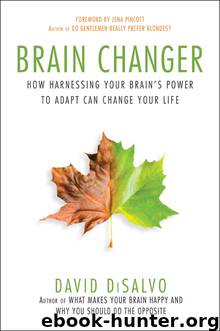Brain Changer by David DiSalvo

Author:David DiSalvo
Language: eng
Format: epub
ISBN: 9781939529015
Publisher: BenBella Books, Inc.
18. Manifest Your Resilience
IT IS IN THE KNOWLEDGE OF THE GENUINE CONDITIONS OF OUR LIFE THAT WE MUST DRAW OUR STRENGTH TO LIVE AND OUR REASON FOR ACTING.
—Simone De Beauvoir
In his book The UltraMind Solution, Dr. Mark Hyman provides an excellent description of one of the most essential brain-changer tools in our arsenal, resiliency: “Resiliency is that hard-to-measure quality of adapting to change, shifting with changing tides rather than drowning, seeing the glass half full, or knowing how to turn lemons into lemonade.”21
Hyman uses the term “plasticity” synonymously with resiliency because, as he points out, the nature of the brain mirrors the nature of our thoughts, beliefs, and attitudes. “A stiff, rigid, ‘hard’ personality is reflected in stiff cells, hard, rigid plaques in the brain, and a general loss of resiliency and the ability to renew, remember, and repair.”
Hyman’s research leads us to a few conclusions about the power of resiliency, and why it’s among the most important tools in this section. First, adaptation itself is an ongoing form of resiliency. To say that we “pragmatically adapt” to the ebbs and flows of existence means, in part, that we do not allow ourselves to be psycho-emotionally overtaken by any challenge—past, present, or future.
Here we can add a complementary term: tenacity. Resiliency requires tenacity—the drive to push through, overcome, and step above anything that threatens to stop us. This isn’t a slogan for an athletic shoe; this is an evolutionary reality that affects everyone to varying degrees. And if your sights are set on achieving goals, it most assuredly affects you.
In consumerist cultures, resiliency loses much of its flavor because it is central to marketing campaigns spinning ultra-positive, ultra-individualist messages. Our brains adapt to these messages, and we’ve learned that in large part they are meaningless. We do not become more resilient or tenacious or focused by wearing the most successfully marketed brand of athletic shoes or tight-fitting gym shirts, or anything else of the sort.
We do become more resilient by realizing the adaptive advantages of resiliency and acting accordingly. Knowing that our brains respond well to flexible thinking and poorly to rigid thinking, for example, empowers us to work toward greater flexibility in our thinking. That, in turns, shows us the “proof of concept” (to borrow an engineering phrase) in the positive outcomes we begin experiencing in our lives.
BCP: Remember: flexibility promotes adaptive brain change. Resilience is all about flexibility, and you can’t harness your brain’s adaptive power without it.
Download
This site does not store any files on its server. We only index and link to content provided by other sites. Please contact the content providers to delete copyright contents if any and email us, we'll remove relevant links or contents immediately.
The Art of Thinking Clearly by Rolf Dobelli(8874)
Mindhunter: Inside the FBI's Elite Serial Crime Unit by John E. Douglas & Mark Olshaker(7853)
Change Your Questions, Change Your Life by Marilee Adams(6666)
Nudge - Improving Decisions about Health, Wealth, and Happiness by Thaler Sunstein(6645)
Mastermind: How to Think Like Sherlock Holmes by Maria Konnikova(6259)
The Power of Now: A Guide to Spiritual Enlightenment by Eckhart Tolle(4776)
Men In Love by Nancy Friday(4345)
Factfulness: Ten Reasons We're Wrong About the World – and Why Things Are Better Than You Think by Hans Rosling(4033)
The Confidence Code by Katty Kay(3577)
Thinking in Bets by Annie Duke(3542)
Man and His Symbols by Carl Gustav Jung(3331)
The Worm at the Core by Sheldon Solomon(2930)
Three Women by Lisa Taddeo(2927)
Why Buddhism is True by Robert Wright(2836)
Liar's Poker by Michael Lewis(2823)
The Inner Life of Animals by Peter Wohlleben(2778)
Descartes' Error by Antonio Damasio(2747)
The Power of Mindful Learning by Ellen J. Langer(2717)
The Slow Fix: Solve Problems, Work Smarter, and Live Better In a World Addicted to Speed by Carl Honore(2580)
